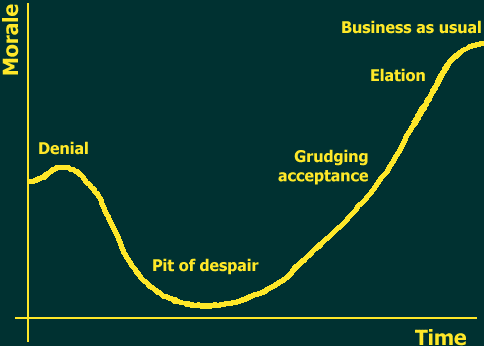Are Stages of Change Scientifically Valid?
When applying cognitive design to organizational problems we approach change efforts, optimize work flows, implement benefit programs, facilitate decision-making meetings, plan team-building events and offer rewards and the like on the basis of how minds really work.
A classical example is the application of Kübler-Ross’s five-stage grief model to managing organizational change. Kübler-Ross observed terminally ill patients and argued that they went through five stages of grief including denial, anger, bargaining, depression and acceptance.

[image source: Scientific American]
Organizational theorists and management consultants picked this up and crafted models for employees that were doing something akin to grieving as they had to navigate a fundamental change/loss at work.
This insight helps us tune change strategy and tactics based on the different cognitive needs of the five mental states. So for example, you would not want to bombard someone who is in denial with your fact-based case for change.
I am not sure this has helped much. Planned organizational change is still very difficult to carry off with success.
Something is wrong, but what? Michael Shermer in a recent opinion piece in Scientific American titled Five Fallacies of Grief: Debunking Psychological Stage Theory, argues that grief theory and other stage theories in psychology have very little evidentiary support. This is a big claim so I did a literature search on grief stages and found just a few studies and with conflicting findings. I was very surprised.
Mr. Shermer explains why it has become so popular (despite the lack of plentiful scientific support) by pointing out that stages create nice mental categories and a chronology that facilitates story telling. And after all,
“We are pattern-seeking, storytelling primates tyring to make sense of an often chaotic and unpredictable world”
Explanations or theories that break complex phenomenon into stages plays very well with the way our minds naturally work. In short, stage theories appear to be popular because they have an excellent cognitive design not necessarily because they are scientifically valid.
This does not mean we should not use grief-stage theory to shape our approach to organizational change in a more cognitive friendly way, it just means we should treat it as a hypothesis rather than a fact. It also means that we should not assume we know what the cognitive needs of our employees are based upon simple sense making frameworks but instead go out and observe, study, model and measure what they actually are.

September 10th, 2011 at 7:37 am
plastic product design…
[...]Cognitive Design » Blog Archive » Are Stages of Change Scientifically Valid?[...]…
September 26th, 2011 at 10:25 am
ambicija…
[...]Cognitive Design » Blog Archive » Are Stages of Change Scientifically Valid?[...]…